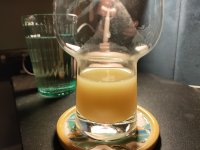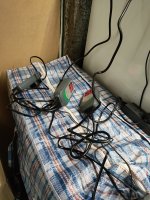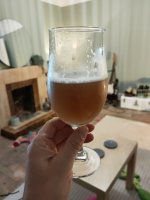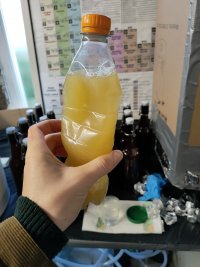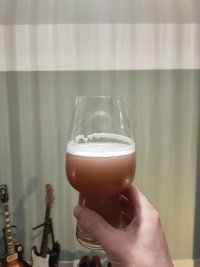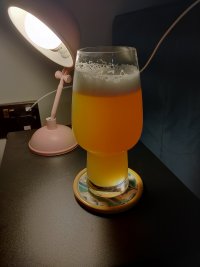You are using an out of date browser. It may not display this or other websites correctly.
You should upgrade or use an alternative browser.
You should upgrade or use an alternative browser.
Can an overnight mash recover a too hot mash?
- Thread starter BasementArtie
- Start date

Help Support Homebrew Talk:
This site may earn a commission from merchant affiliate
links, including eBay, Amazon, and others.
Very minimally.Would water chemistry be effected?
If you had added 1 liter of cold water or ice (or replaced it), water chemistry would have been affected by about 1/25 if you had 25 liters of mash water in your kettle.
If your water is (heavily) chlorinated, yeah, adding a pinch of "Meta" powder to the "correction water" would be best. But first of all, you need to work fast, bringing the temps down. The mash left for 10 minutes in that high range can make a noticeable difference.Would I have to have some treated (campden) water frozen. Or would normal Ice have been okay?
Best is to nail the target temp after it's stirred and fully hydrated.
It may take a few times to hone in on your strike water temp to come out right on target. There are calculators for that, but each system is a little different, so you still need to tweak it a little. Keep notes.
Keep in mind, it's much easier to add (ice) cold water to drop the mash a few degrees than it is to raise it by the same amount.
When higher temp mashing (to reduce fermentability, say in Milds), it's best to have the mash temp come down from the top slightly, while stirring, than it is to raise it. Reason is, enzymatic conversion is relatively fast, in the first 10 minutes half can be done already. It depends on how finely milled the grist is, and how fast you can fully hydrate it. The thinner the mash, the faster hydration and thus conversion.
FYI, full volume (BIAB) mashes are thin.
You may enjoy a bit higher mash efficiency by including a sparge. Even a small, (e.g., 2 gallon) dunk sparge is better than none, as high gravity wort remains trapped in the grist. Squeezing or pressing can only recover so much.
bracconiere
Jolly Alcoholic - In Remembrance 2023
when i did my rice beers with alpha amylase, before i knew i needed to tag team it with gluco too, i usually got a FG of around 1.035.Anyone care to guess what the FG will be haha?
but those had an OG of 1.060
BasementArtie
Well-Known Member
- Joined
- May 24, 2021
- Messages
- 169
- Reaction score
- 116
I am shook, shocked, flabbergasted, flummoxed, bamboozled. Plain old stumped.
The Wednesday morning hydrometer reading has just given me a FG of 1.013 (my hydro reads to 1.000 with distilled water to TOP of the meniscus @20C). Just checked the hydro and it's still calibrated, not cracked or broken. That's a ~83% attenuation.
Also before anyone asks I can guarantee the temperature of the mash didn't drop below 70C for 90minutes...beer/wort just seem to be more resilient to my f*ck ups than I thought.
As I said at the start this stumped me. I was expecting anything in the range of 1.020-1.030FG however I don't know what's happened.
Did the overnight mash work...are there even mechanisms for it to work?
Does BIAB mash thickness come into play, from BYO "Thicker mashes tend to retain more beta-amylase activity at high mash temperatures than do thin mashes. This is because beta-amylase is more stable when joined with its substrate than when it is not."?
Does water chemistry have anything to with it?
Let me know what you guys and gals think.
The Wednesday morning hydrometer reading has just given me a FG of 1.013 (my hydro reads to 1.000 with distilled water to TOP of the meniscus @20C). Just checked the hydro and it's still calibrated, not cracked or broken. That's a ~83% attenuation.
Also before anyone asks I can guarantee the temperature of the mash didn't drop below 70C for 90minutes...beer/wort just seem to be more resilient to my f*ck ups than I thought.
As I said at the start this stumped me. I was expecting anything in the range of 1.020-1.030FG however I don't know what's happened.
Did the overnight mash work...are there even mechanisms for it to work?
Does BIAB mash thickness come into play, from BYO "Thicker mashes tend to retain more beta-amylase activity at high mash temperatures than do thin mashes. This is because beta-amylase is more stable when joined with its substrate than when it is not."?
Does water chemistry have anything to with it?
Let me know what you guys and gals think.
Attachments
Yes, yes and yes.
Except that BIAB (usually) employs a much thinner mash than a typical three vessel system....
Does BIAB mash thickness come into play, from BYO "Thicker mashes tend to retain more beta-amylase activity at high mash temperatures than do thin mashes. This is because beta-amylase is more stable when joined with its substrate than when it is not."?
...
You might be seeing "Hop Creep":
"There is evidence that hops have amylolytic enzymes in or on them that biochemically modify beer during dry-hopping, leading to degradation of long-chain, unfermentable dextrins into fermentable sugars. This increase in fermentable sugars can, in the presence of yeast, give rise to a slow secondary fermentation, which is referred to as 'hop creep.'"
Brew on


$53.24
1pc Hose Barb/MFL 1.5" Tri Clamp to Ball Lock Post Liquid Gas Homebrew Kegging Fermentation Parts Brewer Hardware SUS304(Liquid Hose Barb)
Guangshui Weilu You Trading Co., Ltd

$22.00 ($623.23 / Ounce)
AMZLMPKNTW Ball Lock Sample Faucet 30cm Reinforced Silicone Hose Secondary Fermentation Homebrew Kegging joyful
无为中南商贸有限公司

$176.97
1pc Commercial Keg Manifold 2" Tri Clamp,Ball Lock Tapping Head,Pressure Gauge/Adjustable PRV for Kegging,Fermentation Control
hanhanbaihuoxiaoshoudian

$10.99 ($31.16 / Ounce)
Hornindal Kveik Yeast for Homebrewing - Mead, Cider, Wine, Beer - 10g Packet - Saccharomyces Cerevisiae - Sold by Shadowhive.com
Shadowhive

$20.94
$29.99
The Brew Your Own Big Book of Clone Recipes: Featuring 300 Homebrew Recipes from Your Favorite Breweries
Amazon.com

$53.24
1pc Hose Barb/MFL 1.5" Tri Clamp to Ball Lock Post Liquid Gas Homebrew Kegging Fermentation Parts Brewer Hardware SUS304(Liquid MFL)
yunchengshiyanhuqucuichendianzishangwuyouxiangongsi

$58.16
HUIZHUGS Brewing Equipment Keg Ball Lock Faucet 30cm Reinforced Silicone Hose Secondary Fermentation Homebrew Kegging Brewing Equipment
xiangshuizhenzhanglingfengshop

$28.98
Five Star - 6022b_ - Star San - 32 Ounce - High Foaming Sanitizer
Great Fermentations of Indiana

$7.79 ($7.79 / Count)
Craft A Brew - LalBrew Voss™ - Kveik Ale Yeast - For Craft Lagers - Ingredients for Home Brewing - Beer Making Supplies - (1 Pack)
Craft a Brew

$33.99 ($17.00 / Count)
$41.99 ($21.00 / Count)
2 Pack 1 Gallon Large Fermentation Jars with 3 Airlocks and 2 SCREW Lids(100% Airtight Heavy Duty Lid w Silicone) - Wide Mouth Glass Jars w Scale Mark - Pickle Jars for Sauerkraut, Sourdough Starter
Qianfenie Direct
BasementArtie
Well-Known Member
- Joined
- May 24, 2021
- Messages
- 169
- Reaction score
- 116
So I agree mash thickness is thin compared with a three vessel system with BIAB so it's unlikely this. My thickness so this brew was 3.3L/kg which overall isn't anything too large.Except that BIAB (usually) employs a much thinner mash than a typical three vessel system.
You might be seeing "Hop Creep":
"There is evidence that hops have amylolytic enzymes in or on them that biochemically modify beer during dry-hopping, leading to degradation of long-chain, unfermentable dextrins into fermentable sugars. This increase in fermentable sugars can, in the presence of yeast, give rise to a slow secondary fermentation, which is referred to as 'hop creep.'"
Brew on
How fast does hop creep act / drop FG and provide consumable/fermentatable sugars? If it's a slow process I doubt it would be this either (in isolation) as the brew has only been in contact with hop matter (~200g) for roughly 7days.
Seems a bit of a stretch that alone brought the FG down roughly 10points on the best case scenario I was expecting, or maybe I'm underestimating how huge hop creep can be and really need to factor this in next brew I make
OK, so you had the grains in the mash for 90 minutes. How much of that time was the actual conversion of starch to sugar? It takes several minutes to denature enzymes, most often mentioned is 10 minutes at 170F (about 77C) for mash out. How finely did you have your grains milled? Very finely milled grains can get you full conversion in less than 10 minutes that it might take to denature the enzymes and the rest of your 90 minutes were used to extract flavor and sugars. I often will do my BIAB mash at 156 to 158F (69 to 71C) and get a final gravity of 1.012 because my conversion is over before the enzymes are denatured.I messed up a mash temp for my newest beer (Double NEIPA) and ending up mashing at 70-72C for 90 mins.
BasementArtie
Well-Known Member
- Joined
- May 24, 2021
- Messages
- 169
- Reaction score
- 116
So I overcooked my strike temp and after dropping the grain in and thoroughly mixed my mash it was at 72C which probably was taken 5 mins after dough-in. Then it was a frantic 85mins that followed with the lid off stirring/mixing and constantly measuring temp in various places withing the mash where I only got it down to 70C at 90mins. This is when I called it a day. Covered it back up and left it for 10 hours. Came back was at 62C.OK, so you had the grains in the mash for 90 minutes. How much of that time was the actual conversion of starch to sugar? It takes several minutes to denature enzymes, most often mentioned is 10 minutes at 170F (about 77C) for mash out. How finely did you have your grains milled? Very finely milled grains can get you full conversion in less than 10 minutes that it might take to denature the enzymes and the rest of your 90 minutes were used to extract flavor and sugars. I often will do my BIAB mash at 156 to 158F (69 to 71C) and get a final gravity of 1.012 because my conversion is over before the enzymes are denatured.
So my last brew was a 9% quad which I brewed at 65-63C and nailed the temperature and that only dropped to 1.009 FG (although if it was a Tripel with all lighter grain I'm thinking it would have been lower). So for messing up temp on this brew and still getting an FG of 1.013 I'm very happy although I don't understand how.
Homebrew Harry
Well-Known Member
- Joined
- Jul 25, 2021
- Messages
- 387
- Reaction score
- 397
I've been lurking on this one. I'm glad it turned out OK
BasementArtie
Well-Known Member
- Joined
- May 24, 2021
- Messages
- 169
- Reaction score
- 116
I'm thinking, I might do an overnight mash again if I mess up strike temp on the high end. Give those lone betas a chance to ravage the lands.I think it's good to remember that enzymes do not denature all at once. It is not an on/off switch. Furthermore, with extended time, only a very small amount of beta is needed to carry on the job.
I might even try with my next NEIPA to replicate this and mash starting at 73C and letting it drop to 71C and then overnight. Luckily with the style if it finishes higher it's not the end of the world.
I haven't read the entire thread, but you could end up with a sour mash. I've purposely done a sour mash a couple times by leaving it for 24 hours. Your temps may have been too high for that though. I think the ideal temp for a sour mash is between 100-110F (38-43C).
You are right, it depends on the temperature. If it cannot be maintained, then the mash will sour. Made my first kettle sure this way by accident, was quite alright actuallyI haven't read the entire thread, but you could end up with a sour mash. I've purposely done a sour mash a couple times by leaving it for 24 hours. Your temps may have been too high for that though. I think the ideal temp for a sour mash is between 100-110F (38-43C).
BasementArtie
Well-Known Member
- Joined
- May 24, 2021
- Messages
- 169
- Reaction score
- 116
I think 62c and 10 hours may be a bit hot and short for the lactobacillus. However this was a consideration when I did thisI haven't read the entire thread, but you could end up with a sour mash. I've purposely done a sour mash a couple times by leaving it for 24 hours. Your temps may have been too high for that though. I think the ideal temp for a sour mash is between 100-110F (38-43C).
Whenever i want the OG below 1.008 I do an overnite reverse mash . Mash in at 68* and by morning it sits around 61*-63*.
BasementArtie
Well-Known Member
- Joined
- May 24, 2021
- Messages
- 169
- Reaction score
- 116
BasementArtie
Well-Known Member
- Joined
- May 24, 2021
- Messages
- 169
- Reaction score
- 116
BasementArtie
Well-Known Member
- Joined
- May 24, 2021
- Messages
- 169
- Reaction score
- 116
BasementArtie
Well-Known Member
- Joined
- May 24, 2021
- Messages
- 169
- Reaction score
- 116
Completely irrelevant to the overnight mash / high temp mash question but more to do with the actual beer and the NEIPA style and bottling.
Here are two pictures of the same beer. The first being the last bottle filled about half way (maybe just over actually between 1/2 - 2/3) the other second photo filled to the brim (literally too much, note to self it nearly pushed out of the rubber gasket of the flip top so I cooled them down in the conditioning tub).
One is brown from what I can assume is the oxygen mixing with the proteins and hop oils and the other fresh and bright as hell. Obviously everyone by now know oxygen is the main enemy of the NEIPA but I thought another visual representation after 6 days can't be a bad thing.
Here are two pictures of the same beer. The first being the last bottle filled about half way (maybe just over actually between 1/2 - 2/3) the other second photo filled to the brim (literally too much, note to self it nearly pushed out of the rubber gasket of the flip top so I cooled them down in the conditioning tub).
One is brown from what I can assume is the oxygen mixing with the proteins and hop oils and the other fresh and bright as hell. Obviously everyone by now know oxygen is the main enemy of the NEIPA but I thought another visual representation after 6 days can't be a bad thing.
Attachments
Stormcrow
Well-Known Member
- Joined
- Apr 14, 2020
- Messages
- 591
- Reaction score
- 661
A picture really is worth a thousand words.Completely irrelevant to the overnight mash / high temp mash question but more to do with the actual beer and the NEIPA style and bottling.
Here are two pictures of the same beer. The first being the last bottle filled about half way (maybe just over actually between 1/2 - 2/3) the other second photo filled to the brim (literally too much, note to self it nearly pushed out of the rubber gasket of the flip top so I cooled them down in the conditioning tub).
One is brown from what I can assume is the oxygen mixing with the proteins and hop oils and the other fresh and bright as hell. Obviously everyone by now know oxygen is the main enemy of the NEIPA but I thought another visual representation after 6 days can't be a bad thing.
BasementArtie
Well-Known Member
- Joined
- May 24, 2021
- Messages
- 169
- Reaction score
- 116
Non-scientific just observational. Compare the carbonation test bottle colour after 2 weeks again head space was much more than the filled high bottles. Tasted great still though
And here is another filled high bottle (I think it's darkened slightly since bottling but the smell still popped ). Didn't taste very different but smell was lost a bit in the test PET bottle when compared to this filled high one.
). Didn't taste very different but smell was lost a bit in the test PET bottle when compared to this filled high one.
Obviously it's oxygen/oxidation causing the problem on the under filled bottles. However I've got a weird feeling that it's not the traditional effects of oxidation we're seeing. With this drastic colour change I would expect to taste the difference however that doesn't seem to happen.
And here is another filled high bottle (I think it's darkened slightly since bottling but the smell still popped
Obviously it's oxygen/oxidation causing the problem on the under filled bottles. However I've got a weird feeling that it's not the traditional effects of oxidation we're seeing. With this drastic colour change I would expect to taste the difference however that doesn't seem to happen.
Attachments
Similar threads
- Replies
- 18
- Views
- 5K
- Replies
- 18
- Views
- 3K
- Replies
- 66
- Views
- 14K
- Replies
- 39
- Views
- 9K


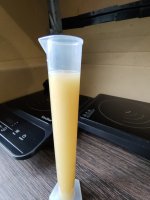











![Craft A Brew - Safale BE-256 Yeast - Fermentis - Belgian Ale Dry Yeast - For Belgian & Strong Ales - Ingredients for Home Brewing - Beer Making Supplies - [3 Pack]](https://m.media-amazon.com/images/I/51bcKEwQmWL._SL500_.jpg)

































